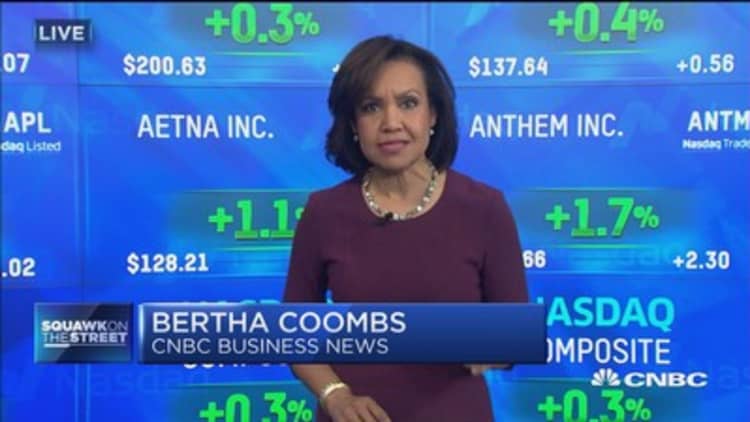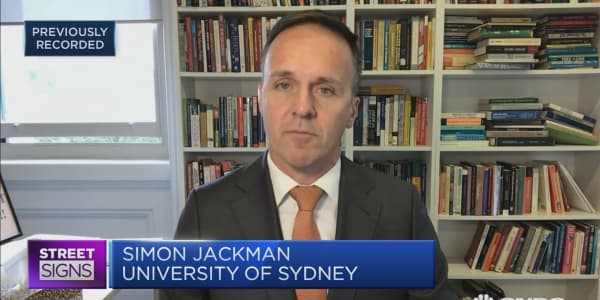Donald Trump's ascension to the presidency will likely mean a reversal of fortune for hospitals that have financially benefited from Obamacare — and will present new risks to insurers already struggling to make money selling plans under the Affordable Care Act, experts say.
But Trump's tendency to abruptly change his mind — about policy goals and other things — makes it difficult, if not impossible, to predict how extensive the financial fallout or windfall will be for either of those health-care sectors.

Trump campaigned on a promise to repeal and replace Obamacare, the massive law that among other things has led to decreases in the nation's uninsured rate by increasing the number of people with coverage.
It's far from clear how different a new system would be, particularly after the Republican-led Congress weighs in with its own proposals.
"I have no idea what they're going to do," said Gary Claxton, vice president of the health-care policy research group Kaiser Family Foundation.
"The bills that [GOP leaders in Congress] put out, while they had principles in them, I don't know that they were ever intended to be enacted."
But Claxton said that based on what Trump and congressional Republicans have said, it's reasonable to expect "less coverage, or less generous coverage" for many people.
"If you start with the hospitals, it seems unlikely that as many people will have coverage that is as generous as currently exists," Claxton said.
"So that means that when they go to the hospitals, they'll have less money to pay with, or less insurance. So it seems unlikely this will be good for hospitals."
Claxton also said that if Trump follows through on a promise to block-grant Medicaid funding to states — as opposed to subsidizing that program for the poor based on a state's count of enrollees — that could also lead to decreased revenue for hospitals. So could proposals to give states more flexibility in how they design their Medicaid benefits for enrollees, which could lead to revenue decreases for hospitals.
Minda Wilson, a Los Angeles-based corporate attorney specializing in health care, agreed. "I think the hospitals are not going to do well, period," she said.
The stock prices of big hospital companies, such as HCA, Tenet Healthcare, Universal Health Services, Community Health Systems and HealthSouth, plunged after Trump's election.
Wilson noted that under Obamacare, hospitals were already facing significant cuts to reimbursements for treating patients with Medicare, the federally operated system that provides health coverage to primarily senior citizens.
A Trump administration could exacerbate that loss of income by cutting or even eliminating the tax credits that most customers of Obamacare marketplaces receive to help offset the cost of their monthly insurance premiums, she said. Such cuts would mean fewer paying customers for hospitals.
"I think whether or not they [hospitals] do worse will depend on whether the government continues to subsidize the subsidies they agreed to pay," said Wilson, author of the recently published book "Urgent Care: Ten Cures for America's Ailing Healthcare System."
Wilson also noted that while Trump has talked about a complete repeal of the ACA, it's not clear if some of the lesser-known parts of that law actually would be scrapped — which also would have consequences for hospitals.
One of those parts penalizes hospitals if Medicare patients who were treated for certain conditions, including heart attacks and pneumonia, end up being re-admitted to a hospital within 30 days of being released.
It would be "a big loss" for hospitals financially if Trump's repeal of the ACA did not repeal that particular provision, Wilson said.
The ACA has also authorized, and encouraged, the creation of so-called Accountable Care Organizations — groups of hospitals and doctors that agree to coordinate medical treatment for Medicare patients in hope of both improving patient outcomes and getting a financial reward from the Medicare system for doing so.
"There won't be Accountable Care Organizations if the ACA is [fully] repealed," Wilson said.
Robert Laszewski, president of Health Policy and Strategy Associates in Virginia, said it's true that hospitals "have a huge risk here" if Obamacare is repealed without any meaningful replacement, and the 25 million or so people who have gained health insurance since the law went into effect suddenly lost that coverage.
Laszewski, who is an Obamacare opponent, said that would lead to hospitals dealing with many more uninsured people coming through their emergency rooms, and having to eat the costs of covering those nonpaying patients.
But Laszewski doesn't foresee such a scenarios as likely.
He does, however, see a big risk for insurance companies arising in the next several months when the next Congress begins work on effectively repealing Obamacare and coming up with a replacement.
Republicans "face a huge crisis in keeping Obamacare's wheels on in 2018, and they need to address that," he said.
There is "no doubt that they're going to defund Obamacare," which will "virtually repeal the law," Laszewski said. He expects the new Congress, when it cuts off funding for the ACA, to set a date some time in the future, likely Jan. 1, 2019, when that funding will actually stop.
The sunset date means that funding would continue until then for Obamacare subsidies for customers of government-run insurance marketplaces, and for federal funding of Medicaid enrollees who became eligible for such coverage when their states agreed to loosen the sign-up rules for Medicaid.
But then, Laszewski said, the question becomes what will replace Obamacare — and how easy it will be to get such a replacement passed into law.
That is a much harder question, he said, because while it takes just 51 votes in the Senate to defund Obamacare, it will take 60 votes to replace it because such bills require that supermajority.
"You've got yourself a lengthy, controversial, complicated process to replace it, in which they will need Democratic support," Laszewski said. "You could have a scenario here where the Republicans defund Obamacare, and they're unable to get 60 votes," and Congress temporarily maintains funding for ACA programs by a series of continuing resolutions, he said.
Both the uncertainty of what would replace Obamacare and the months it would take to pass that into law are what worry insurers — and what could lead more of them to abandon the individual health plan market or risk booking bigger losses until a replacement is put into effect, he said.
Those insurers would be faced with the prospect of not having in place a plan that would maintain the level of subsidies many of their customers have under Obamacare. Without such subsidies, many people, particularly healthy ones who cost insurers little or no money to cover, would exit the individual health plan marketplace.
"Most insurance companies are losing money in Obamacare [plans] in 2016. You have to believe it's going to get worse in 2017," Laszewski said. "Sick people are going to stay on the [customers] rolls, but a lot of healthy people are going to say, 'I'm going to wait for an alternative'" under Trump.
And within months of the Jan. 31 close of open enrollment for 2017 plans, starting in April, insurers will have to begin submitting their proposed prices for the 2018 coverage year.
The fact that a replacement for Obamacare is not likely to be passed by then is leaving insurers "besides themselves" with anxiety, Laszewksi said. "They have to make a decision in the April time frame about whether they're going to participate or not," he said.
"They're feeling enormous ... pressure right now. The smart business decision is not to participate in 2018," Laszewski said. "What insurance company executive would be crazy to stick around in 2018 as a favor to Republicans?"
Kaiser's Claxton said that when a replacement plan is put into place, it is not clear if insurers' financial situation will improve in the individual health plan market.
Given the fact that fewer people are likely to be insured in that market, "I think the revenues go down" for insurers, "but they may be more profitable," Claxton said.
Claxton also said the elimination or loosening of ACA regulations on insurers, who before Obamacare could deny coverage or charge higher rates to sicker patients, could make it easier for insurers to make money on the individual plan market.
That anticipation by investors of easier money might be part of the reason why the share prices of big insurers including Unitedhealth, Aetna, Humana, Cigna and Anthem have surged on the heels of Trump's victory.
The first three of those insurers had, earlier this year, revealed they would dramatically scale back their presence in Obamacare markets for 2017, citing losses on individual plans. Cigna before the election abandoned its intention to expand its presence in those markets in 2017. And Anthem had warned a week before the election that it could scale back its Obamacare plans in 2018 if results don't improve next year.
But Claxton said that if there isn't any, or much government subsidization of lower-income customers for insurers insurance companies, it could make it harder to book a profit on individual plans.
Claxton also sees a threat to insurers who are in the Medicaid managed care market. If Medicaid enrollment goes down under Trump, and if state funding for Medicaid programs decreases, that could negatively affect the bottom line of insurers in the Medicaid market.





